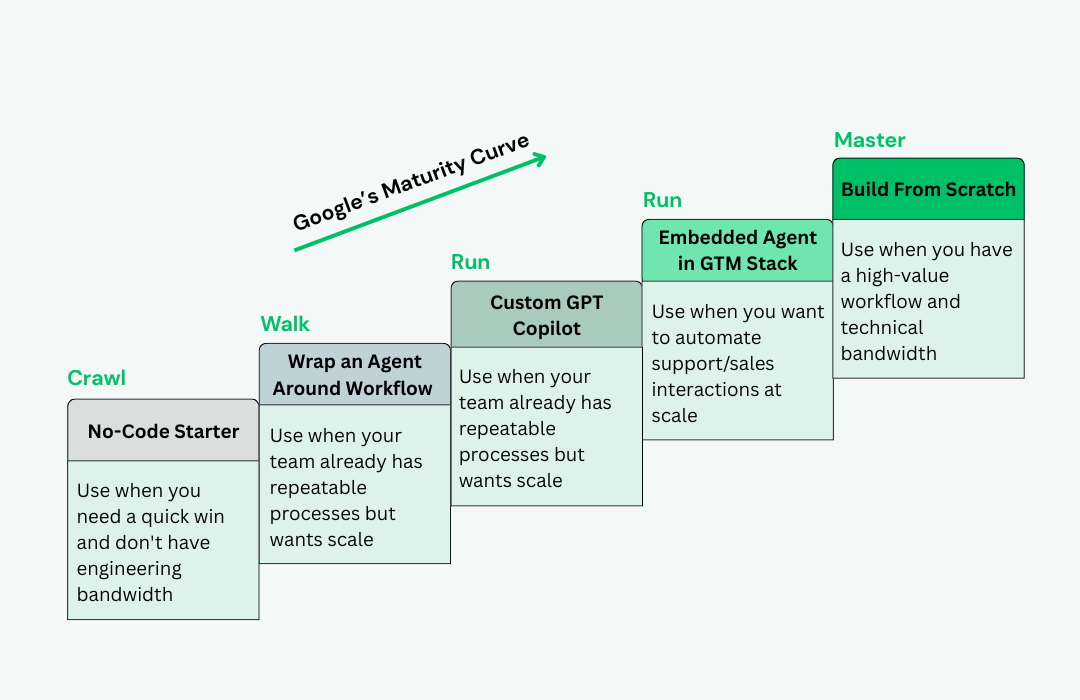Are you in sales and looking to get promoted into management?
This was the gist of a question Scott Barker posed on LinkedIn.
Now, look at his advice: To become a sales manager, you essentially need to become an extension of your HR team — something every employee can do to make a positive impact on the organization.
This got me thinking about the habits and traits of my peers that have moved from IC (individual contributor) to sales management roles recently. Besides the “hustle & hard work” that everyone attributes to their success, there had to be something else they were doing to separate themselves.
These traits don’t necessarily need to be something that ICs do consciously — which is important to note. They’re simply success habits that natural-born leaders tend to adopt.
Of course, I also wanted feedback from industry veterans — the folks who are training & coaching sales management teams around the globe. What traits or skills do they look for in new managers?
And I wanted to create a takeaway framework that you can apply if you’re interested in moving up to a sales management role.
Keep reading to get:
- Stories from 6 new sales managers
- Insights from 11 sales trainers and coaches
- A 6-step framework you can use to be recognized as a leader
Advice from 6 New Sales Managers
I tapped into my network and found individuals who have moved into management in the past year or so. I asked them:
“What qualities / habits / strategies did you use to move into management? These can be unconventional, unintentional, or traditional routes.”
Here’s what they had to say.

Brittany Wroblewski – Director of Strategic Partnerships at G2
The best advice I received when trying to move from IC to Manager is “do the job you want,” meaning, if you want to be a manager / leader start acting like it as an IC.
If you’re already doing manager activities — helping the team, sharing best practices, being a leader, etc. — it’s much easier for your manager to advocate for your promotion and, most importantly, for the team to view you as a leader and someone they can count on and trust.
 Zachary Thompson – SDR Team Lead at DiscoverOrg
Zachary Thompson – SDR Team Lead at DiscoverOrg
When I first started as an individual contributor, I had a hunger to learn as much as I possibly could from our top producers and from thought leaders in my space. Over the years, I’ve maintained that hunger.
I’ve also built habits around learning and building relationships with people to facilitate continued growth and learning. I made a habit of asking top producers on our SDR team and our AE team — and even our sales leadership and executive teams — to lunch so I could pick their brains and build rapport with them.
Over time, that developed into a reputation. Other individual contributors looked up to me, and more and more, I would have both new reps and experienced reps coming to me to ask questions or to bounce ideas around.
But more than just my individual growth and learning, I prioritized sharing what I learned with my peers — setting up informal seminar-style talks, role playing and practicing talk tracks, intentionally making myself available for other reps to come and talk to.
And that action of leading by example, even without any official title or position or monetary incentive, caught the attention of other leaders and managers and prompted my move into a more strategic management role.

Mike O’Connor – Manager, West RM Team at G2
When I made the decision that I wanted to get into Management, I shifted the way I thought about our challenges to a more high-level business lens.
I was one of the original Relationship Managers at G2 (which is the team I manage today) so in the first 6 months, there were a LOT of things we had to figure out.
As an Individual contributor, it’s easy to get caught up in the weeds and focus on all the mini fires that need to be put out.
When I decided that I wanted to be in management, however, I started thinking about the themes I was seeing and would communicate them to my then Manager so he knew that I cared about where this team was going and had ideas on what needed to be done for us to succeed.
When I started doing that, my leadership noticed that I was focused on the long-term mission and the TEAM rather than just myself, which I was told played a role in me ultimately being promoted.

Kyle Willis – BDR Manager at Directive Consulting
I was offered a specialist position at Directive (which I turned down) and pitched my CEO on building a sales team from the ground up.
The first 4–6 months were spent solely hustling. I went to 20–30 doors a day trying to get in front of any VP of Marketing at a B2B company who was on my targeted list and would hear me out.
I was delivering our case-studies book and realized it may not be enough. I started to key in on the details and began capitalizing on personalization. For example, one VP who let me in her office had a green smoothie on her desk, so I followed up with a killer smoothie recipe on my next visit. (We closed that deal.)
In sales, it’s all about the revenue generated. We can sit here and talk about all of the different KPIs (which are extremely important), but at the end of the day, you’re in your seat to drive revenue for the company.
If you’re sitting in a sales position and are trying to get into management, my 3 nuggets are:
- Spend as much time as you can with a top performer and understand their craft. Identify the areas in which they are more disciplined or have skills that are just a little bit sharper than yours. Go back to the table and hone your craft.
- Do what others are doing AND do what others aren’t. There is a reason that star sales rep consistently hits quota. And there are other areas of opportunity for you to unlock profitable channels that haven’t necessarily been explored. Find them, and you’ve just become an asset.
- Work out first thing in the morning. Studies show that you will have more energy, be in a better mood, and will be overall more productive if you exercise in the morning. I’m a 4:30am’er personally and firmly believe in early workouts and early bedtimes. On top of this, the discipline learned in the gym will naturally flow over into your career life.

Ryan Abramson – RVP Sales at G2
There are two behaviors that have served me best in my sales career. They are, in order…
1. Continuous learning. If I’m not selling, I’m reading, listening, watching, asking for advice, and assessing my skills. All with the intention of improving.
First, I try to understand what I need to improve on. Then, I seek out the resources and start learning.
When I got my first sales job, I went to Barnes and Noble (yes, I went to a bookstore) and picked out classic sales books from pioneers like Zig Ziglar. More recently I read books like The Challenger Sale, Never Split the Difference, Pitch Anything, and To Sell is Human. I recommend starting with pure sales books because unless you are a great seller, the path to promotion and management is a lot longer and harder.
From there, I moved into reading books about the business of startups like The Lean Startup and Blitzscaling. Knowing how the business moves from a macro perspective is a key part of succeeding in management.
Then I read books about management and culture like PEAK and Radical Candor. These helped me understand human motivation and managerial psychology. Some of my methods are unique to me, but a majority of them are combinations and adaptations of amazing tactics I’ve read over the years.
2. Hard Work. In sales and in life, there is no substitute for this. Work longer and harder than others, and you will succeed.
One caveat is to understand the skills and methods you need to be working on prior to working harder. Otherwise, you will be running in the wrong direction.
They say, work smarter not harder… I say, get smart and work harder.
 Becc Holland – RVP, Business Development at G2
Becc Holland – RVP, Business Development at G2
Not to be difficult, but I had absolutely ZERO strategy moving into management. I actually FOUGHT executive level at the time on whether I would make a good leader.
I was an AE & Enterprise AE, and when I came out to the Bay area, I took a step “back” to become an SDR so I could understand the tech ecosystem before I started closing again. I was a frontline SDR for 6 months, and based on the numbers I was posting, my CRO asked me to build and manage a global team.
Knowing the “rule” is that the best Individual Contributor is NOT always the best manager, I asked him why he thought I would make a good leader, because I thought I was a bit too self-centered for the job.
After I set appointments for AEs, I often would jump on the call and coach AEs on how to ask more compelling questions, since I was still a closer at heart. I would mute the microphone and feed them questions to ask throughout the demo — and it started to change the trajectory of their deals and drive higher conversion rates into closed revenue.
My CRO told me that the oddest part of the setup was that AEs were actually listening to me and going to me for sales questions before they even went to him, even though I was just an SDR.
He said that whether I was “self-centered” or not was another question, and it was something he could coach me on. But based on what he had seen, he thought that I had an inherent love for coaching whether I knew it or not, and wanted me to take that same passion to grow the SDR team.
3 Key Takeaways
After reading these 6 IC-to-Management stories, I see three common themes:
- Thirst for knowledge (natural curiosity)
- Unrelenting work ethic
- Find a mentor or be a mentor to someone else
It’s no secret that hard work leads to success and that natural curiosity/thirst for knowledge are keys to getting a promotion. Both of these subjects have been thoroughly written about in the last few years.
I think Zachary Thompson hit on a few very important points, but before dissecting them, I think it’s important to get two sides of a story.
Insights from 11 Top Sales Trainers & Consultants
You’ve read what successful ICs have done to get to the next level. Now, let’s ask the experts.
I asked some of the top sales trainers and consultants in the world this question:
“What actionable advice would you give an Individual Contributor that would increase their chances of getting promoted into their first management position?”
Here’s what they said:

Kristie Jones – Principal of Sales Acceleration Group
When I was starting my career, my father told me, “Dress for the job you want, not the job you have.”
Although he meant that literally, he knew that by dressing for the job I wanted next, I would also start to act and think like a person in that position, thus setting myself apart from my peers. It was psychological.
My dad’s advice still holds true today. If you want to increase your chances of being considered for a sales management position, find an employee that you believe you can help get to the next level and offer to mentor them.
This will accomplish a few things. It will allow you to see if you are actually good at it and find joy in helping others succeed (not every individual contributor will enjoy the move to management).
It will give the leaders in your company an opportunity to see your leadership and coaching style in action.
Lastly, if you are successful in taking your mentee to the next level, you will have earned the respect of your co-workers and they will have confidence in your ability to lead and coach them should the opportunity arise in the future.

Brynne Tillman – CEO of Social Sales Link
Great sales people don’t always make great sales leaders, so if this is an aspiration, there are a lot of aspects to consider:
- Do you have the ability to inspire and motivate?
- Do others come to you for answers?
- Do you have the patience to explain things multiple times?
- Do you feel personal satisfaction when someone else succeeds?
- Are you interested in analyzing the data behind success?
- Do you thrive in a collaborative environment?
- Are you willing to fall on the sword to protect your team?
- Are you able to take an unbiased view of any given situation?
- Can you coach for improvement rather than blame for mistakes?
- Are you ready to enable others to be responsible for your paycheck?
Sales leadership is one of the Peter Principal positions that can derail a career. Just because someone is an amazing producer does not mean they’ll make an amazing manager. Before considering a promotion, take that into consideration.
Once you’ve thought that through, I would recommend becoming a collaborative team player in your current role.
An easy way to do this is to share your successes and failures and encourage others to do the same. High tide lifts all boats, and if you can help lead a team from the deck of the ship, you’ll be a better commander of the fleet when the time comes.

Lars Nilsson – CEO of SalesSource
What actionable advice would I offer on how to become a sales manager? Three things:
- Soft skills / EQ – Self-awareness, self-regulation, and empathy are the big three for rising to sales management.
- Leadership – Know when your team can do better and needs a little push, and when they’re struggling and need you to advocate for them. Build a high level of trust.
- Execution – Executing on individual goals is hard. Executing on a strategy for a team is even harder.
If you want to be promoted into a sales management position, start thinking outside of your own goals now. If you’re a top performer, how can you make those around you better? Who can you support? What tactics and strategies can you suggest to management now?
Another “must do” is to seek mentorship of leaders who have been in the position you want. You will need them in your journey since they have seen and experienced what you have not.

Lori Richardson – President, WOMEN Sales Pros
- Keep track of your successes, achievements, and wins — in writing. At the end of every day, jot these down. It only takes a couple of minutes and, believe me, a comprehensive journal of these will pay off in a promotion and other rewards.
- Learn how your company operates financially and how your customers’ businesses operate financially. Take an online class about profit and loss. Meet with your CFO or head of finance.
- Focus on shining a light on others as much (or more) than yourself. Don’t just work on getting you promoted. Work on solving business issues, which may include your peers doing great work.
- Listen to the feedback you receive, and be open to it. If someone in a leadership role doesn’t see what you see, it doesn’t make you wrong. But it is on you to show up in a different way or to do something different.

Richard Harris – CEO of The Harris Consulting Group
Instead of asking your boss for advice on how to get promoted, ask them if there are any projects you can work on to support them — and promise it won’t affect quota. If you can do it without telling them it’s because you want to be promoted, that is best.
You want them to ask, “Why do you want to do that?”
Then you say, “Well, my goal is to move up, but I’m not gonna whine about it. I want to show everyone I’ll do what it takes.”
You do it that way, and you just took a part of their soul.

Barbara Giamanco – CEO of Social Centered Selling
If you want to become a sales manager, first be a sales superstar in your current role. Go above and beyond quota expectations to demonstrate you have what it takes to lead.
Next, make your intention known to the right executives in your company, starting with your boss. Focus on communicating the next level of value you can bring to your company in a management role. If you just want a promotion and more money… move along.
Finally, learn, learn, learn! Read books, watch videos or webinars, get coaching, talk to other managers about what the job really entails… in other words, prepare.
Transitioning from individual contributor to sales manager isn’t easy, but with the right mindset, willingness to learn, and hard work, you can do it!

Matt Cameron – CEO of SaaSy Sales Management
Two things will help you become a sales manager:
- Think “ABH” (Always be helping.) – Distinguish yourself by becoming the “go-to” person reps seek assistance from. You’ll take some burden from your manager and establish yourself in the minds of your peers as a leader.
- Behave like management, not union – Start wearing a “perspective lens” that sees things from the company’s angle when discussing things like territories and quotas. If you always empathize with the team, it will hold you back.

Alice Heiman – Founder of Alice Heiman, LLC
Build a development plan for yourself. Determine what you will learn and when. If you want to learn leadership, find books, podcasts, webinars, and courses and take learning into your own hands.
Find a mentor. Find someone who is a great leader. Ask that person to mentor you.
But before you do, research mentoring and figure out what type of mentoring you want, so you can ask for that. Don’t give up. If one person can’t mentor you, find another.
This doesn’t have to be a leader from your sales team or organization. Ask your friends for the best sales leader they know and get an introduction so you can ask if they will mentor you.
You don’t have to be the boss to be a leader. Find ways to lead in your current position. Lead a project or a small group. Start a book club of your peers who would also like to learn leadership skills.
Read The Inner Edge by Joelle Jay.

John Barrows – CEO of JBarrows
Become more of a scientist than an artist. If you’re an artist in sales and don’t have a true sales process, there is no way you will be able to teach anyone else how you do what you do.
If you’re more of a scientist in sales and can outline a process that you implement and improve along the way to drive results for yourself, then you can apply that process to others once you become a manager.
 Jake Dunlap – CEO of Skaled
Jake Dunlap – CEO of Skaled
The only way to get promoted is to know your boss’ boss’ expectations. You have to know what they care about, above and beyond hitting quota, to earn a promotion.
Keep in mind, leadership isn’t a goal — because you can’t control whether or not you achieve it. Work with your Director / VP on their key non-sales-related expectations and make it your goal to be excellent at those. That’s the path to becoming a sales manager.

Keenan – CEO of A Sales Guy Inc.
Become the current team’s informal leader. If they will follow you without a title, they will follow you with one.
3 Key Takeaways
These 11 experts offer quite a few lessons and advice for getting promoted to sales management. I loved that none of them talked about work ethic or knowledge, because those are prerequisites for success, but they aren’t the defining difference.
It’s kind of like getting your bachelor’s degree. Everyone is getting one. So when you’re up for a job, it boils down to how else you’re different.
The differentiators are traits, or habits — which you have total control over.
Here are three traits that were touched on from the consultants, along with a breakdown for how to do them and real examples from my experience.
- Without asking, take initiative to solve problems for your boss or your company that are outside of your job description (without letting it affect IC quota).
- How? Think about 3 problems your boss is dealing with this month. Now think about 3 problems your company is dealing with this half. Of these 6 problems, which one can you help solve? Start there. If you can’t think of any problems, you need to get to know your boss or company better. Seek out people in positions of authority and ask how you can be helping them.
- Real example at G2: Anna Najduch was our Senior Implementation Specialist responsible for onboarding new clients. We started to launch complex API integrations that customers could buy, but it was up to the customer to set them up (outside Anna’s job description). Instead of working 9–5, Anna spent extra time to learn how these integrations worked by spending time with the lead developer who built them. Then she started volunteering to take all integration calls so she could help our customers make the most out of their purchase. Since Anna went above and beyond her job description, G2 created a new role for her — Solutions Consultant.
- Be the resource your team comes to for help, advice, and direction.
- How? It takes time to develop, but the easiest way is by becoming a product expert. Get to know the finer details of your product/service and be the go-to resource for questions from people at your company. Another great way is to offer your help to new hires. If you can be a resource for them on Day 1 (with no expectations in return) then you are already a leader to them on their first day.
- Real example at G2: Mike O’Connor was one of our first account managers when we shifted our sales org to start incorporating them. From Day 1, he was the go-to resource for anyone in the company (especially other AM’s) who had questions about process, talk tracks, and best practices. Mike made everyone around him better when it wasn’t part of his job description. So when the team got big enough, Mike was the clear choice to manage the team.
- Create a repeatable process that can help others.
- How? Document everything. Think critically about how to scale the work you do and make sure to keep it recorded and written down somewhere. Build a playbook around it.
- Real example at G2: Walter Mansky was the first BDR hired at G2. I was the second. When I got in the door, Walter already had created several pages of workflows for how he was doing his job. A lot of it was template-based stuff around our industry reports so he downloaded a tool called aText to save templates that you could type in “*XYZ” and it would auto-write the template for you. The other process-based work included screenshots of exactly how to do admin work, so it was super straight-forward. I would not have been nearly as successful if Walter didn’t spend a bunch of time documenting his work to share. Eventually, we expanded his framework to train new BDR’s.
6-Step Framework: IC —-> Management
To leave you with an actionable framework, develop these 6 success habits to start cementing your first promotion into sales management.
- Develop a Thirst for Knowledge – Read books, listen to podcasts, consume content from leaders in the industry, meet with top performers at your company, network with people in your industry.
- Have an Unrelenting Work Ethic – Motivate yourself to out-work your peers while being the leader on the company dashboards. Develop good habits to make the most of your time.
- Find a Mentor or be one – Having a mentor is like having a GPS when driving. Without them, you only see open roads, and you have no idea where they lead. With a mentor, you can arrive at your destination faster with less time spent guessing what path to take.
- Solve Problems Outside of your Job Description – Without asking, take initiative to solve problems for your boss or your company, including problems you aren’t responsible for. Start by identifying those problems and finding the 1–2 you have the skills to solve.
- Become your Team’s Informal Leader – Be your team’s internal resource for advice, best practices, and direction. Become the product expert who people can rely on, and help new employees ramp up quickly.
- Create a Repeatable Process That Can Help Others – Document what you are doing and make it a science. Fine-tune it, tweak it, and make sure others can follow it while leaving room for creativity.
Make the Leap to Sales Management
The 6-Step Framework I shared above is the perfect way to become a sales manager. But if you implement those 6 steps, you’ll be a better (and more valuable) asset to your company, whether or not you take the next step into management.
So start building the habits that will make you the obvious choice for a promotion. Along the way, you’ll discover whether leadership is something you really want — or if you honestly prefer leading from the ranks.
Either way, you’ll develop a mindset that makes you successful in any sales role you fill — both now and in the future.







